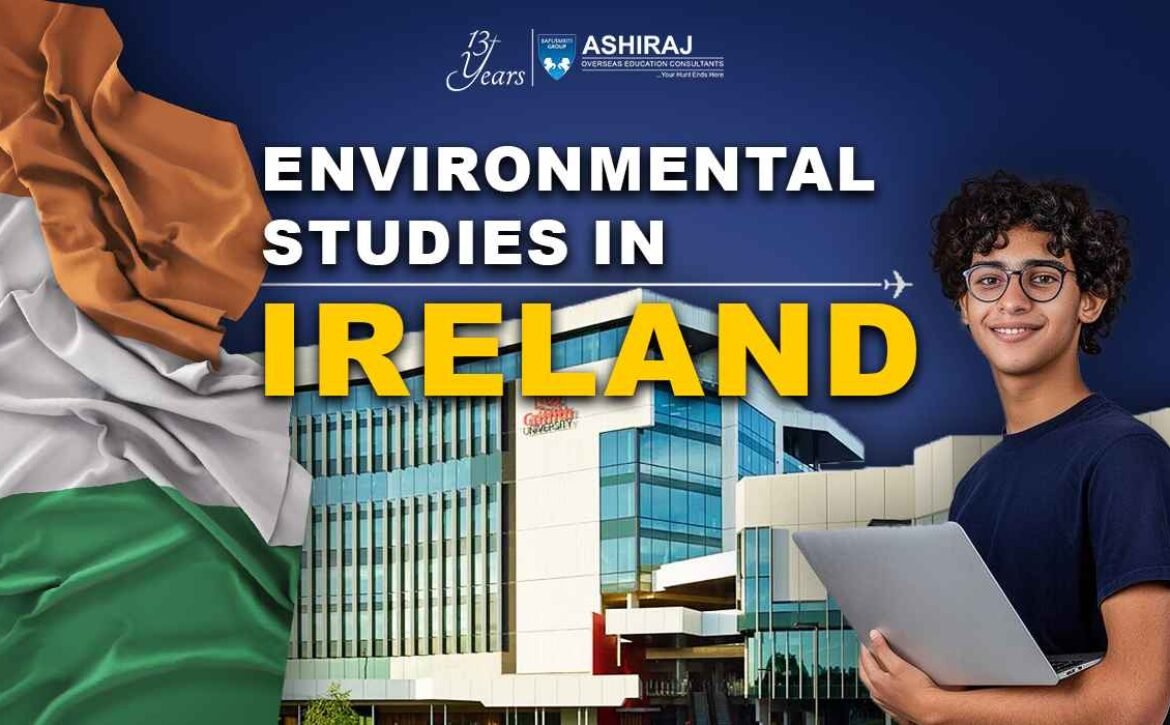
Environmental Studies in Ireland
Environmental studies in Ireland encompass a diverse range of ecological, social, and policy-oriented research and education initiatives aimed at understanding and addressing environmental challenges. Ireland, known for its lush landscapes, vibrant ecosystems, and rich biodiversity, serves as a compelling case study for environmental studies. From the rugged coastal cliffs of County Clare to the serene lakes of Killarney National Park, Ireland’s natural beauty is intricately tied to its environmental research efforts. Academic institutions and research centers across the country are actively engaged in studying topics such as climate change adaptation, sustainable agriculture, renewable energy technologies, and biodiversity conservation.
The field of environmental studies in Ireland plays a pivotal role in shaping national environmental policies and fostering sustainable practices across industries. By integrating scientific research with societal needs, Ireland aims to mitigate environmental impacts while promoting economic development. Collaborative efforts between government agencies, academia, and local communities underscore Ireland’s commitment to achieving environmental sustainability amidst global challenges. Environmental studies in Ireland are pivotal in shaping a resilient and eco-conscious future for the nation and beyond.
Why to Study Environmental Studies in Ireland?
- Rich Natural Heritage: Ireland boasts diverse ecosystems, from verdant landscapes to coastal wonders, providing hands-on learning opportunities.
- Academic Excellence: Renowned universities offer cutting-edge programs in environmental sciences, attracting students globally.
- Research Opportunities: Access state-of-the-art facilities and collaborate on impactful research projects focused on climate change, biodiversity, and sustainability.
- Global Perspective: Gain insights into international environmental policies and practices through Ireland’s active participation in global environmental initiatives.
- Career Advancement: Graduates from Irish institutions are highly sought-after by multinational corporations, NGOs, and government agencies due to their well-rounded education and practical skills.
- Cultural Experience: Immerse yourself in Ireland’s rich culture and history while studying in a welcoming and inclusive environment.
- Networking: Build connections with experts in the field through seminars, workshops, and conferences, enhancing your professional network
- Sustainable Practices: Learn from Ireland’s commitment to sustainability, exemplified by its renewable energy efforts and conservation strategies.
- Personal Growth: Develop a global perspective, critical thinking skills, and leadership qualities essential for tackling environmental challenges worldwide.
- Quality of Life: Enjoy a high standard of living and a safe, supportive environment conducive to academic and personal growth.
Studying Environmental Studies in Ireland provides a transformative educational experience, equipping you with the knowledge and skills to make a positive impact on the planet.
Top Universities to Study Environmental Studies in Ireland
Rank | University | QS World Ranking 2023 | Average Annual Fees (EUR) | Programs Offered |
1 | Trinity College Dublin | 101-150 | €14,000 | Environmental Science, Sustainable Development |
2 | University College Dublin | 151-200 | €15,000 | Environmental Policy, Climate Change, Ecology |
3 | National University of Ireland, Galway | 201-250 | €13,500 | Marine Biology, Environmental Management, Renewable Energy |
4 | University College Cork | 251-300 | €13,200 | Environmental Science, Geography, Conservation Biology |
5 | Dublin City University | 301-350 | €12,800 | Environmental Technology, Sustainability, Green Energy |
Studying Environmental Studies in Ireland offers a range of options from prestigious institutions known for their research and academic excellence. These universities provide diverse programs addressing crucial environmental issues while offering students opportunities to engage in cutting-edge research and practical fieldwork. Whether focusing on environmental science, policy, or sustainability, Ireland’s top universities equip graduates with the knowledge and skills to contribute meaningfully to global environmental challenges.
Course Curriculum for Environmental Studies in Ireland
- Core Subjects: Cover foundational topics such as ecology, environmental policy, and sustainability principles.
- Fieldwork and Labs: Engage in hands-on learning through field trips to diverse Irish ecosystems and well-equipped laboratories.
- Specialization Options: Tailor your studies with electives in climate change adaptation, renewable energy technologies, or conservation biology.
- Interdisciplinary Approach: Benefit from integrated coursework combining sciences, social sciences, and humanities perspectives.
- Research Opportunities: Conduct impactful research projects on local environmental issues or global challenges.
- Industry Partnerships: Collaborate with government agencies, NGOs, and businesses to address real-world environmental concerns.
- Practical Skills: Develop practical skills in data analysis, environmental impact assessment, and environmental management.
- Guest Lectures and Seminars: Attend sessions by experts in the field, enhancing your understanding of current environmental issues.
- Global Perspectives: Study international environmental policies and practices, preparing for a career in a globalized world.
- Capstone Projects: Culminate your studies with a capstone project or dissertation, demonstrating your expertise in a specific area of environmental studies.
Environmental Studies in Ireland provides a comprehensive education that prepares students to tackle environmental challenges with a multidisciplinary approach, fostering innovation and sustainability in local and global contexts.
Eligibility Criteria & Admission Requirements for MS in Environmental Studies in Ireland
- Language Proficiency:
IELTS: Minimum overall score of 6.5 with no band less than 6.0.
TOEFL: Minimum score of 90 (Internet-based test).
- Standardized Tests (Varies by institution and program):
GRE: Required by some universities; scores typically vary.
GMAT: Required for certain programs; scores vary.
- Academic Certificates:
– Certified transcripts of previous academic qualifications (e.g., bachelor’s degree).
- Work Experience (Varies by program):
– Relevant work experience may be required or recommended for certain programs.
- Passport & Student Visa:
– Valid passport with at least 6 months validity beyond intended stay.
– Student visa application, including proof of acceptance from an Irish university.
Table Format for Test Scores:
Test | Minimum Score |
IELTS | Overall 6.5, no band less than 6.0 |
TOEFL | Minimum 90 (Internet-based) |
GRE | Required by some programs; scores vary |
GMAT | Required for some programs; scores vary |
Prospective students for Environmental Studies in Ireland should ensure they meet these criteria, as they vary by institution and program. Having a clear understanding of these requirements will streamline the application process and increase the likelihood of acceptance into desired programs.
Documents Required for Studying Environmental Studies in Ireland
- Passport:
– Valid passport with at least 6 months validity beyond your intended stay.
- Letters of Recommendation (LOR):
– Two letters from academic or professional references highlighting your skills and achievements.
- Statement of Purpose (SOP):
– A personal statement outlining your academic background, career goals, and reasons for choosing Ireland for environmental studies.
- Curriculum Vitae (CV):
– A detailed resume showcasing your educational qualifications, work experience, and any relevant extracurricular activities.
- Official High School Transcripts and Certificates:
– Certified copies of transcripts and certificates from your high school or equivalent institution.
- Work Experience Certificate (if applicable):
– Proof of relevant work experience in the environmental field, if required by the program.
- Proof of Financial Resources:
– Documentation demonstrating sufficient funds to cover tuition fees, living expenses, and other costs during your stay in Ireland.
Preparing these documents meticulously and ensuring they meet the specific requirements of your chosen university will facilitate a smooth application process for Environmental Studies in Ireland. Submitting complete and accurate paperwork enhances your chances of securing admission to your desired program.
Admission Process for Environmental Studies in Ireland
- Research and Choose Programs: Explore universities offering Environmental Studies programs in Ireland, considering factors like curriculum, faculty expertise, and campus facilities.
- Check Eligibility: Ensure you meet academic requirements, including language proficiency (IELTS/TOEFL), standardized test scores (GRE/GMAT where applicable), and any specific prerequisites.
- Gather Required Documents: Prepare essential documents such as passport, academic transcripts, letters of recommendation (LOR), statement of purpose (SOP), curriculum vitae (CV), and proof of financial resources.
- Submit Application: Complete the online application through the university’s official website or the centralized application system (e.g., UCAS for some institutions). Pay attention to deadlines and submission guidelines.
- Application Review: Await confirmation of receipt and processing of your application. Universities may request additional information or conduct interviews as part of the selection process.
- Receive Offer Letter: If accepted, you will receive a formal offer letter outlining terms of acceptance, including any conditions such as fee payments or additional documentation.
- Acceptance and Visa: Accept the offer and initiate the process for securing a student visa. Provide necessary documentation, including proof of acceptance and financial capability.
- Preparation and Arrival: Prepare for your move to Ireland by arranging accommodation, understanding local regulations, and planning your academic and social integration.
Following these steps systematically ensures a smooth admission process for pursuing Environmental Studies in Ireland, setting the stage for a rewarding academic journey.
“Education is the most powerful weapon which you can use to change the world.”
Nelson Mandela
Cost of Environmental Studies Course in Ireland
- Tuition Fees: Annual tuition fees range from approximately €12,000 to €15,000 depending on the university and program.
- Living Expenses: Estimated at around €10,000 to €12,000 per year, covering accommodation, food, transportation, and personal expenses.
- Health Insurance: International students typically need to budget for health insurance, costing approximately €300 to €600 annually.
- Books and Supplies: Additional expenses for course materials and supplies, averaging around €1,000 per year.
- Miscellaneous Costs: Includes visa fees, travel, and recreational activities, totaling approximately €1,000 to €2,000 annually.
- Scholarships and Financial Aid: Explore opportunities for scholarships and financial aid offered by universities, the Irish government, or external organizations to offset costs.
Understanding these financial aspects helps prospective students plan and budget effectively for their studies in Environmental Studies in Ireland. It’s advisable to research specific costs at chosen universities and consider living standards in different cities to make informed financial decisions.
Scholarships for Environmental Studies Courses in Ireland
Scholarship Name | Amount | Application Deadline |
Government of Ireland International Education Scholarships | Full tuition waiver + €10,000 stipend | Varies by university; typically early March |
Trinity College Dublin Scholarships | Up to €5,000 | March 31 |
University College Dublin Global Excellence Graduate Scholarship | 50% tuition fee reduction | June 30 |
National University of Ireland, Galway International Student Scholarships | €2,000 – €5,000 | April 30 |
University College Cork Excellence Scholarships | €2,000 – €5,000 | May 1 |
These scholarships aim to support international students pursuing Environmental Studies in Ireland by providing financial assistance for tuition fees and living expenses. Application deadlines vary by scholarship and institution, so it’s essential to check specific requirements and deadlines early to prepare a competitive application. Scholarships like these not only alleviate financial burdens but also recognize academic excellence and contribute to a diverse and inclusive educational environment in Ireland.
Career Opportunities After Environmental Studies in Ireland
Job Profile | Average Salary (EUR) |
Environmental Consultant | €30,000 – €45,000 |
Sustainability Officer | €35,000 – €50,000 |
Environmental Scientist | €35,000 – €45,000 |
Renewable Energy Specialist | €35,000 – €50,000 |
Conservation Biologist | €30,000 – €40,000 |
Environmental Studies in Ireland prepare graduates for diverse roles addressing environmental challenges and sustainability issues. These careers involve conducting research, implementing policies, and advising businesses or government agencies on environmental practices. Salaries vary based on experience, location, and specific job responsibilities. Graduates may find employment in environmental consulting firms, renewable energy companies, governmental organizations, non-profit conservation groups, or academia. Pursuing advanced degrees or gaining specialized certifications can further enhance career prospects in the field. Ireland’s commitment to environmental sustainability creates a robust job market for skilled professionals dedicated to making a positive impact on the environment.
Frequently Asked Questions About Environmental Studies in Ireland
Entry requirements typically include a bachelor’s degree, proof of English language proficiency (IELTS/TOEFL), and in some cases, GRE/GMAT scores. Relevant work experience may also be beneficial.
Most master’s programs in Environmental Studies in Ireland are designed to be completed in 1-2 years of full-time study.
Yes, several universities in Ireland offer scholarships for international students, covering tuition fees and providing stipends. Deadlines and eligibility criteria vary.
Graduates can pursue careers as environmental consultants, sustainability officers, environmental scientists, renewable energy specialists, and conservation biologists, among others.
Popular specializations include climate change adaptation, biodiversity conservation, sustainable development, renewable energy technologies, and environmental policy.
Yes, international students with a valid student visa are typically allowed to work up to 20 hours per week during term time and full-time during holidays.
The cost of living in Ireland varies by location but is estimated to be between €10,000 to €12,000 per year, covering accommodation, food, transportation, and other expenses.
Yes, many programs incorporate field trips to diverse Irish ecosystems and offer opportunities for hands-on research and practical training.
International students must apply for a student visa through the Irish Naturalisation and Immigration Service (INIS), providing proof of acceptance from an Irish university and sufficient funds.
It is advisable to start the application process well in advance, as application deadlines vary by university and program. Generally, applications should be submitted at least 6-9 months before the intended start date.




